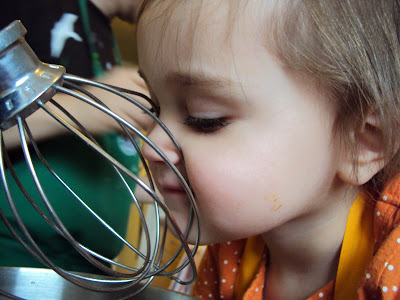 I made the chocolate chip cookie recipe from America's Test Kitchen (A PBS Cooking Show that Rachel and I love to watch on Sunday afternoons.) The recipe is a bit more involved than the recipe on the back of the chocolate chips, but I think it's worth the extra effort. These were easily the best chocolate chip cookies I've ever made. They were chewy, but not too soft, and had a hint of butterscotch flavor. Rach took some great pictures while we baked them, so I thought I'd post the recipe and the photos together.
I made the chocolate chip cookie recipe from America's Test Kitchen (A PBS Cooking Show that Rachel and I love to watch on Sunday afternoons.) The recipe is a bit more involved than the recipe on the back of the chocolate chips, but I think it's worth the extra effort. These were easily the best chocolate chip cookies I've ever made. They were chewy, but not too soft, and had a hint of butterscotch flavor. Rach took some great pictures while we baked them, so I thought I'd post the recipe and the photos together.Ingredients:
10 tablespoons butter
4 tablespoons butter
1/2 granulated white sugar
3/4 cup brown sugar
1 teaspoon table salt
1 teaspoon vanilla extract
1 large egg
1 egg yolk
1 3/4 cups unbleached all purpose flour
1/2 teaspoon baking soda
1 1/4 cups semi-sweet chocolate chips
Step 1: Find the cutest helper you can find.

Step 2: Preheat oven to 375 degrees f.
Step 3: Melt 10 tablespoons of butter in a pot (NOT non-stick.) The butter will foam up, so if you swirl it in the pan, you'll be able to see to the milk solids. (They sink and will be under the foam.) Just when the milk solids start to brown, take the butter off the heat.
Step 4: Add 4 tablespoons butter to the melted butter and let it melt (without heating it anymore.)
Step 5: Pour the melted butter into a bowl. Add 1/2 cup white sugar, 3/4 cup brown sugar, 1 teaspoon vanilla, and 1 teaspoon salt.

Step 6: Mix the sugar and butter mixture for thirty seconds or so, and let it sit for a minute. (If using a stand mixer, the lowest speed is fine.) Repeat three times. -- This step is important since letting the sugar sit for a minute in between mixing allows the sugars to melt, and caramelize before you cook it. This way the cookies come out with just the slightest hint of butterscotch flavor.) When finished the mixture should be glossy.

Step 7: Add the eggs and mix for thirty seconds or so.
Here's a shot of the mixture at this stage:

Step 8: In a separate bowl mix the flour and baking soda together. (I switched to a whisk at this point because I thought I remembered the TV show saying they whisked the flour in... but I think you could stick with the handle to avoid creating too much gluten.)

Step 9: Add the flour/baking soda mixture to the butter/sugar mixture. Mix until flour is incorporated. (If using a stand mixer, you'll want to scrape the bowl half way in between.)

Step 10: Stir in chocolate chips.
Step 11: Use 1/4 c. measuring cup to put hockey-pucks of cookie dough onto ungreased cookie sheet. (You can use parchment paper if you want. I didn't because my cookie sheet is really well seasoned.) If you then press the pucks a little flat, and use a spoon to create a tiny bit of a recess in the middle, they'll come out fairly uniformly cooked throughout.


Here's how I spaced the cookies out. Also, you'll want to cook one sheet at a time. Don't do two batches at once because the top batch will be over done, and the bottom will be under done. Because they cook so quickly, the time it takes to switch them in between will mess up the cooking process.
Step 12: Cook for 8 minutes or so. When the cookies are beginning to brown on the edges, and are still a little soft in the middle, take them out of the oven. They'll finish cooking while they cool for five minutes or so on the sheet. After they have cooled for a few minutes, let them finish cooling on a wire rack.
Step 13: Eat the best cookies you've ever eaten!!!

Hope you enjoy the recipe! And be sure to watch America's Test Kitchen... we love it.


